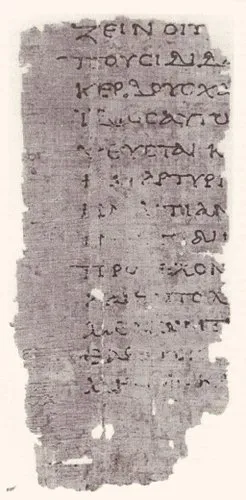Paul's Epistle to Titus, Part 1: Purity Spiraling in Apostolic Christianity
Here we are going to make a presentation of Paul’s epistle to Titus, and we are nearing the completion of a commentary on the apostle Paul which we had begun with the epistle to the Romans on March 28th of 2014, nearly three years ago. We have decided to put Titus in order here before Timothy not only because this epistle was written before either of the epistles to Timothy, but also because we find it appropriate to present 2 Timothy last in our presentation of Paul’s epistles.
The term “purity spiraling” began amongst denominational Christians to describe an extreme manifestation of virtue signalling, which we associate with the wayward and hypocritical form of self-righteousness that often affects Christians of all sorts. I am better than you because I don’t do this or say that, etc. etc. But recently the alt-Right has latched onto it and used it to describe the attitudes of racial purists. This evening we are going to take it back for Christians, but we are going to apply it in the way that the alt-Right uses it, to describe a need for the promotion of racial purity amongst Whites everywhere. So to the secularist Jew-lovers of the alt-Right, the term has a negative connotation. But to us it is a positive idea, because as we all know, purity is next to Godliness.
Paul's Epistle to Titus, Part 1: Purity Spiraling in Apostolic Christianity
The early manuscript evidence for the epistle to Titus is found in the papyrus designated P32, which is esteemed to date from around 200 AD; the 4th century Codex Sinaiticus (א); the 5th century Codices Alexandrinus (A), Ephraemi Syri (C) and Vaticanus 2061 (048); and the 6th century Codices Claromontanus (D) and 088, which is an unnamed manuscript that may be a little older than that, and in which survive only a few fragments, parts of the first 13 verses of this epistle as well as parts of the final chapters of 1 Corinthians. Additionally, Paul’s epistle to Titus is cited or mentioned in the epistles of Ignatius, which date to around the very beginning of the 2nd century, and also by Irenaeus and Clement of Alexandria, who are both of the late 2nd century, and by Tertullian, Origen, and Cyprian, all of whom wrote in the early half of the 3rd century. However none of these early sources add anything to our knowledge of Titus himself or his work in the ministry of Christ.






 Please click here for our mailing list sign-up page.
Please click here for our mailing list sign-up page.







